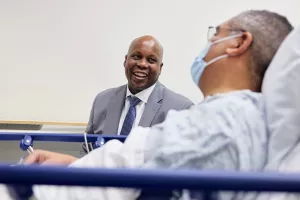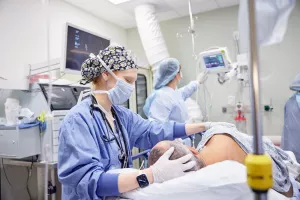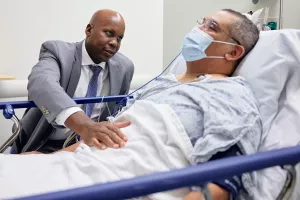Dealing with hemorrhoids, abscesses, fistulas or fissures can be uncomfortable and painful. But the good news is that we can help you alleviate or even eliminate the problem. So don't suffer in silence, let us assist you in finding a solution that works for you.
Don't waste time, talk to your doctor
Many people feel embarrassed when they have problems with their colon, anus or rectum (also called the anorectal area), which might cause them to wait too long before seeking medical help. It's important to talk to your doctor about any symptoms you experience in that area to keep your digestive system healthy.
We will collaborate with you to establish a customized treatment plan, which might involve lifestyle modifications, medication and symptom control. Often, these treatments can solve the problem without requiring major surgery.

Conditions
Every year, millions of Americans experience common disorders related to the anus and rectum, such as hemorrhoids, fissures and fistulas. We want you to know that our team of expert surgeons is here to help you with these conditions:
If you have hemorrhoids, you are among 1 in 20 Americans and half of adults over 50 with swollen veins in their rectum or anus. There's no need to live in discomfort—we treat hemorrhoids using procedures that can be performed during a regular office visit with no special preparation required.
An abscess is a painful bump near the anus or rectum filled with pus. About half of the abscesses develop into fistulas or narrow tunnels or passages that open in the skin near the anus.
An anal fissure is a small tear in the thin skin that lines the anus. Anal fissures are common and usually heal on their own. If your fissure does not heal on its own, your doctor may suggest surgery.
Testing
Several tests can help your doctor diagnose your condition. While most anorectal disorders are benign, our surgeons will perform a careful examination to rule out anal cancer or other serious conditions.
Tests include:
- Physical exam
- Digital rectal exam
- Anoscopy
- Biopsy
- Ultrasound
- Magnetic resonance imaging (MRI)
- Colonoscopy
- Flexible sigmoidoscopy
Treatments
Many treatments for anorectal issues are nearly pain-free and can be done in your doctor's office. If your condition requires surgery, we'll answer your questions, address your concerns and provide personalized care that maximizes your quality of life.
Rubber band ligation and infrared coagulation are the most common hemorrhoid treatments. Both procedures are virtually painless and done in an office visit.
Depending on the location and size of the bump, we will determine the best way to drain the abscess. Fistulas are often treated with minor, same-day surgery.

From regular office visits to inpatient stays, find the healthcare you need and deserve close to home.

Meet the doctors and care team devoted to supporting you every step of the way along your path to better health.